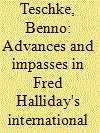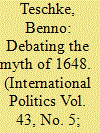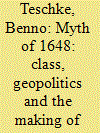|
|
|
Sort Order |
|
|
|
Items / Page
|
|
|
|
|
|
|
| Srl | Item |
| 1 |
ID:
107559


|
|
|
|
|
| Publication |
2011.
|
| Summary/Abstract |
How did Fred Halliday recast International Relations (IR) theory as international historical sociology? This article explores Halliday's intellectual trajectory across this terrain and suggests that the notion of 'capitalist modernity', derived from an amalgamation of neo-Marxian and neo-Weberian historical sociology, functioned as the strategic master-category, which anchored his thought on International Relations throughout his work. This category was successively reconceived and complemented to generate four, partly contradictory, analytical frameworks at a lower level of abstraction: 'global conjunctural analysis'; a neo-Weberian 'sociology of the inter-state system'; 'international society as homogeneity' and 'uneven and combined development'. The article identifies the advances and impasses in each intellectual move and exemplifies the limits of Halliday's approach in relation to his analysis of revolutions. It suggests that while Halliday was instrumental in reconnecting IR with historical sociology, providing crucial openings and correctives to mainstream IR theory, his theoretical emphases remained ultimately too syncretistic and additive to shift the debate on firmer ground. While this can be read as a failure, there is also evidence to understand this anti-formalism as a deliberate intellectual choice. The article concludes by suggesting that the very term international historical sociology, predicated on a distinct modernist vocabulary, may itself preclude a full historicization of categories of analysis, restricting its use as a general framework for capturing the historicity and sociality of geopolitical practices across time and space.
|
|
|
|
|
|
|
|
|
|
|
|
|
|
|
|
| 2 |
ID:
075325


|
|
|
|
|
| Publication |
2006.
|
| Summary/Abstract |
This rejoinder restates and develops the central theses of 'The Myth of 1648: Class, Geopolitics and the Making of Modern International Relations' in relation to a set of objections raised from the perspective of IR Historical Sociology by Hendrik Spruyt, of Political and Social Theory by Roland Axtmann and of Political Geography by John Agnew. Most centrally, it re-affirms the charge of a defective historicisation and theorisation of 'Westphalia' in the discipline of International Relations, while suggesting that a Marxist perspective that emphasises the spatio-temporally differentiated and geopolitically mediated development of Europe is capable of providing a new long-term interpretive framework for the complex co-development of capitalism, state building and the interstate system. It thereby pleads for a paradigm-shift in IR Theory and IR Historical Sociology.
|
|
|
|
|
|
|
|
|
|
|
|
|
|
|
|
| 3 |
ID:
045985


|
|
|
|
|
| Publication |
London, VERSO, 2003.
|
| Description |
xii, 308p.
|
| Standard Number |
1859846939
|
|
|
|
|
|
|
|
|
|
|
|
Copies: C:1/I:0,R:0,Q:0
Circulation
| Accession# | Call# | Current Location | Status | Policy | Location |
| 046991 | 327.101/TES 046991 | Main | On Shelf | General | |
|
|
|
|
|
|
|
|
|